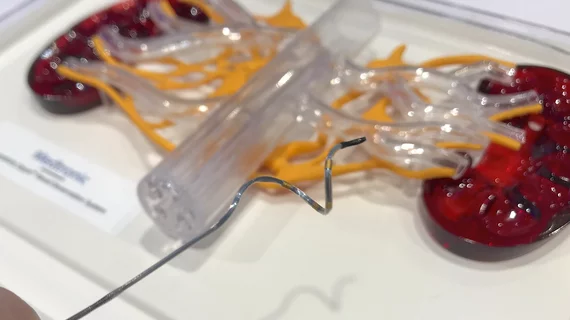Cardiovascular societies support Medicare coverage for renal denervation
More than 70 comments from cardiologists and a letter of support, co-signed by the presidents of the American College of Cardiology (ACC), Society for Cardiovascular Angiography and Interventions (SCAI), and the Society for Vascular Medicine (SVM), urged the Centers for Medicare and Medicaid Services (CMS) to reimburse renal denervation (RDN) therapy to help lower uncontrolled hypertension.
CMS is expected to release a proposed national coverage determination decision memo by July 13.
The CMS public comment period ran from Jan. 13 and Feb. 12. The vast majority of comments were in favor of creating an NCD for RDN.
"Nearly half of the U.S. adult population has hypertension, and despite the availability of medications and lifestyle interventions to manage hypertension, nearly 80% of these individuals do not achieve recommended blood pressure goals," ACC President Cathleen Biga, MSN, FACC, SCAI President James B. Hermiller, MD, MSCAI, SVM President Elizabeth V. Ratchford, MD, FSVM, wrote in their letter to CMS.
They said the shortfall is due to several challenges associated with medical and lifestyle therapy, and there are multiple social determinants.
"The cost of medications, adverse side effects, limited access to healthcare, and poor adherence to prescribed treatment regimens compound the overall low rates of blood pressure control. While some of these barriers are addressable, there is clearly a need for additional solutions, like RDN, to help patients manage their blood pressure," they wrote.
They also pointed to clinical trial data, which show reduction in blood pressure in patients who faced severe challenges in doing so using the standard of care. Many other cardiologists echoed similar comments.
There are now two renal denervation systems cleared by the U.S. Food and Drug Administration (FDA) from Recor Medical and Medtronic. They received CMS transitional pass-through (TPT) payment in the 2025 Medicare Hospital Outpatient Prospective Payment System.
The technology uses catheters placed into the renal arteries to ablate the renal sympathetic nerves to reduce blood pressure by permanently propping the vessels in a fully open position to increase kidney filtration. RDN is intended to complement medications and lifestyle changes in patients with uncontrolled hypertension.
CMS said it received a complete, formal request to provide coverage for RDN by these vendors.
Read more details on the effort to gain CMS coverage for RDN.

